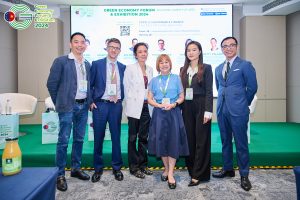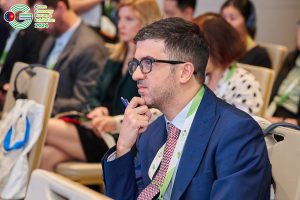Hanoi, 22/10/2024 – AICS Hanoi participated to the Vietnam Green Economic Forum and Exhibition – GEFE 2024, held in Ho Chi Minh City from the 21st to the 23rd of October. The event, hosted by EuroCham Vietnam, brought together key stakeholders from businesses, government, and non-governmental organizations from Europe and Vietnam to engage in technical and policy discussions and advocate for sustainable practices and projects.
AICS Hanoi joined the session on Sustainable Finance as Marco Gaspari, Environmental Sector Coordinator, took part in the panel “From Green to Growth – Unpacking Vietnam’s Carbon

Participants of the panel “From Green to Growth” – GEFE 2024
Market Potential“. The panel provided a space for understanding the market landscape in Vietnam, delving into the current regulatory framework and discussing the roles of both public and private sectors in shaping the carbon market. Panelists also exchanged ideas on opportunities for businesses, financial institutions, governmental bodies, and local communities to contribute to and benefit from carbon markets, identifying challenges such as accurate carbon accounting, market transparency, and alignment with global standards.
AICS Hanoi shared its thoughts on how carbon credit projects should maintain the integrity of their credits while also providing social and environmental benefits to local communities, pioneering the so-called “beyond just carbon” approach. The integrity of a credit refers to how accurately and effectively that credit represents a C02 equivalent emission reduction or removal.
In a market that is evolving at a very fast pace, AICS Hanoi highlighted the current challenges in the Voluntary Carbon Market (VCM). “In 2023, the VCM saw a 56% decrease – said Marco Gaspari – mainly due to growing scrutiny and criticism from the media and monitoring groups questioning the effectiveness and management of carbon credit projects. In response, new initiatives focused on high standards, such as the release of core carbon principles by the Integrity Council for the Voluntary Carbon Market (ICVCM), have been introduced”.
Gaspari suggested that to create high-quality carbon credits, one should consider market trends and demands, along with important aspects like the type of emissions affected, the goal of the

AICS Hanoi Environmental Sector Coordinator, Marco Gaspari at GEFE 2024
carbon credit project, and the specific natural resources of the country involved. Regarding emissions, Gaspari pointed out that currently buyers seem to prefer credits that focus on removing carbon rather than just reducing it. He also encouraged project developers to prioritize projects with clear social benefits linked to Sustainable Development Goals (SDGs), in line with the new Core Carbon Principles (CCPs).
Additionally, AICS Hanoi Expert presented examples from other areas of the world that factored in these variables and that could be replicated in Vietnam. Among these example Gaspari
mentioned integrating mangrove restoration in Nature-Based Tourism-NBT projects or using rice husk for biochar production. Vietnam has over 150.000 hectares of mangrove forest cover which hold great potential for carbon sequestration. It is also one of the largest rice producers, and the rice global value chain accounts for over 2% of global Greenhouse gas -GHG, emissions.
The discussion ended with a general remark on the need to invest more in carbon credit education and awareness to ensure that project developers are not only meeting regulatory demand but are also pioneering locally adapted technologies to accelerate Vietnam’s decarbonization efforts.
